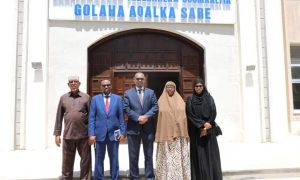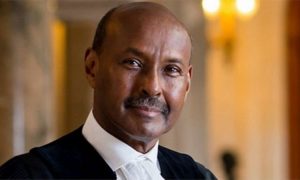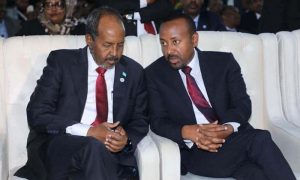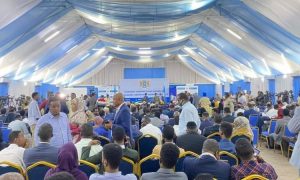
In the Somali context, we can ask the same question of what’s the trouble with Somalia. This question is relevant not only over the course of the last three decades of state collapse but rather since we gained independence in 1960. Our political history teaches us that our forbearers did not had right understanding of modern state and how to reconcile it with our traditional society. In fact, they inherited an alien state structures and legal framework that were in conflict with the foundations of Somali society: Islam and clan system. Critically thinking, if our forbearers and leaders (political, social, religious and etc.) had right understanding and acted accordingly, national state institutions would not have faltered and collapsed within 30 years.
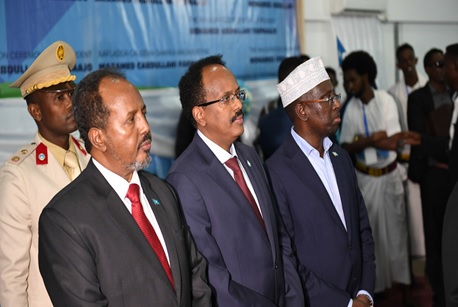 Certainly, the fundamental reason for Somali state failure and collapse is the state-society conflict aggravated with the deficit of democracy and leadership capacity. Glancing back at last three decades, we realize that Somalia went through two phases since the collapse of the state in 1991. The first phase was 10 years (1991-2000) in which the so called warlords were engaged in a bloody civil war under the banner of clans. It should be very clear though that there is no political animosity between Somali clans despite the fact that low intensity conflicts on pasture and water may take place occasionally.
Certainly, the fundamental reason for Somali state failure and collapse is the state-society conflict aggravated with the deficit of democracy and leadership capacity. Glancing back at last three decades, we realize that Somalia went through two phases since the collapse of the state in 1991. The first phase was 10 years (1991-2000) in which the so called warlords were engaged in a bloody civil war under the banner of clans. It should be very clear though that there is no political animosity between Somali clans despite the fact that low intensity conflicts on pasture and water may take place occasionally.
Indeed, the nature of the devastating conflict was greedy elite conflict on power and resource that emerged widely after the military regime took over power in 1969. This regime blocked all political space and freedom of speech in line with socialist doctrine and the culture of dictatorship. In response, armed oppositions emerged in 1980s and toppled the regime through mobilizing their armed clan militia and arousing clan sentiment. Thus, it could be stated with certainty that both the regime and the armed oppositions instrumentalized clan sentiment, divided communities, weakened nationalism and lastly collapsed the regime and the state altogether.
The second phase began with the Djibouti-held Somali Peace and Reconciliation Conference (SPRC) in 2000. This conference was the first turning point and complete paradigm shift regarding Somali reconciliation approach. It offered civil society the leading role in the reconciliation, instead of the warlords who have dominated political landscape since 1991. It is worth noting here that SPRC adopted a new framework based on the famous 4.5 clan power sharing formula. Participants in this conference refused other options, such as regional or district-based power-sharing proposed by some experts. For about 20 years, Somalia still uses the 4.5 clan power-sharing system. Evidently, all 5 administrations established since 2000 suffered structural anomaly and experienced huge challenges because of the clan power sharing that crippled its functionality. Indeed, clan power sharing model that empowered clan elders spawned vicious cycle of state failure since 2000.
Drawing lessons from our history of state-building, the Somali state was recovered in 2000 on the concept of comprehensive reconciliation. This means reconciling the state and society, reconciling among clans and reconciling state and Islam. During this period, federalism was also adopted as part of reconciliation gesture and trust-building approach in order to break from the dictatorial culture and centralized unitary state. Throughout this period which spanned 20 years, various Somali administrations had repeatedly failed to produce properly functioning institutions. The selection of members of the parliament by their clan elders should be understood only as the first step of reconciliation process in addition to accepting federalism implemented haphazardly.
This system was just aimed at bringing Somalis together and forming a nominal state even though malfunctioning. Thinking pragmatically and having in mind gradual and evolutionary process, it should be understood that without clan-power sharing approach and accepting federalism, Somalia would have been disintegrated. Accepting these two conceptions was just like a ‘cease fire’, ‘the first aid’ and ‘transitional phase’ not the proper state-building approach and permanent solutions.
The projected election of 2020/21 marks the second turning point breaking from clan power sharing to party politics, the first being clan empowering instead of warlords in 2000. It will be the time of reviving the role of citizens and empowering them to elect their leaders in a “one person one vote” election model. Of course, this turning point and transition process will be very challenging as it reintroduces election in Somalia since 1969. Carrying out a fair democratic election is a huge task that requires changing perceptions, approaches and political culture. This culture consists of four compounded elements: political clannism, commercialization of politics, fraud and violence, and foreign patronage.Historically, this political culture was gradually developed during Italian trusteeship (1950-1960). It was derived from the adopted party system, which was a replica to the Italian political party system and rampant corruption. Moreover, the election system based on the “first past-the post” and district constituencies aggravated local political conflicts and encouraged political clannism, rigging elections and violence. This party system and the election model led to the emergence of clan-based political parties which hit the highest point of more than 60 parties in 1969.
Therefore, to rebuild democratic and prosperous Somalia, the above stated political culture should be mitigated through systemic approach and raising awareness. For instance, to mitigate clannization and commercialization of politics, the election model of proportional representation (PR) of single national constituency was officially adopted. Accordingly, members of the parliament will be elected through national vote of closed list. In this system, politicians lose enthusiasm of buying votes comparing to the single district constituency. Moreover, projected use of biometric system and registered voters will also minimize rigging elections and restore trust in the electoral process. Finally, foreign patronage will not be effective in the presidential system comparatively with the parliamentary system where the president is elected by members of parliament.
The presidential system may be even better if presidential system is adopted and the president and his deputies are elected in one ticket with constitutionally mandated tasks for each to address inclusivity of all clans. This system looks like collective leadership structuring the government into clusters of ministers that comes under the mandate of the president and his deputies. The ongoing efforts to achieve this historic milestone will essentially amend the current political culture in Somalia. This means breaking vicious cycle of Somali state failurestarts from holding proportional representation election model, adopting presidential system and implementing proper electoral system with registered voters.
.
.
.
Dr. Abdurahman Abdullahi (Baadiyow)
Email:abdurahmanba@yahoo.com
————–
.
.
.
Xafiiska Wararka Qaranimo Online | North America
____________________________________________________________
_____________________________________________________________________________________Xafiiska Wararka Qaranimo Online | Mogadishu, Somalia
_____________________________________________________________________________________Advertisement
_____________________________________________________________________________________


